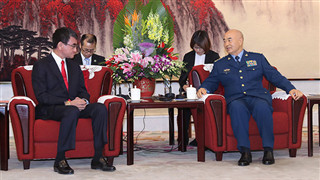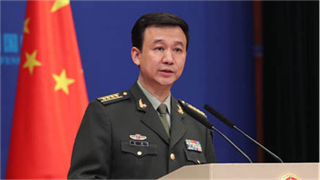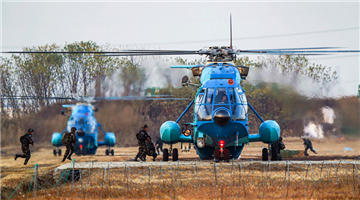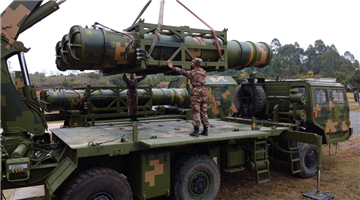Any attempts by the United States to stifle China's development will be in vain, and will only backfire and harm the US, Senior Colonel Wu Qian, a spokesman at the Ministry of National Defense, said at a news briefing in Beijing on Thursday.
"If someone insists on forcing China into being a competitor, then China will certainly be a formidable one," Wu said when commenting on the recent hawkish rhetoric and actions by the US, which he said have "blatantly interfered with China's domestic affairs" and seriously damaged military-to-military relations and bilateral ties.
In early December, US Defense Secretary Mark Esper said China is now the United States' top military priority, and he accused Beijing of seeking "veto power" over the economic and security decisions of smaller nations.
John Rood, under secretary of defense for policy, said earlier this month that China has a massive military budget that it will use to "militarize" the South China Sea, improve its cyberattack capabilities and space potential and undermine the current world order.
On Dec 20, the US signed the 2020 National Defense Authorization Act into law. The $738 billion military spending bill includes clauses that support the protests in Hong Kong, improve Taiwan's defense capabilities through military exchanges and arms sales and require the compilation of regular reports on the condition of Muslim minorities in the Xinjiang Uygur autonomous region.
"It is blatant interference in China's domestic affairs, and seriously violates the one-China principle and three joint communiques between China and the US," he said.
"It has damaged the growth of China-US military-to-military relations and bilateral ties, undermined mutual trust and cooperation, and the Chinese military resolutely opposes these acts," he said.
"The recent baseless accusations against China lodged by US officials sound like a criticism of the US itself," Wu said. "The NDAA authorizes a $738 billion military budget for the US, accounting for over 40 percent of global military spending. I don't know how the US has the conscience to criticize other countries for having a big military budget," he said.
Moreover, the NDAA greenlighted the launch of the US Space Force. Wu said US efforts to greatly expand its space combat capability will lead to an arms race and the militarization of outer space.
"The US is citing so-called military threats from other nations as an excuse to build its Space Force. Its intention is to pursue an absolute military advantage in space. This can easily lead to arms races and seriously threatens peace and security in space, as well as global strategic stability."
For the South China Sea, Wu said the so-called freedom of navigation operations in the region are "extremely irresponsible and dangerous", and should be renamed "hegemonic navigation".
"The US actions have seriously undermined the sovereignty and security interests of countries in the region, damaged regional peace and stability and threatened the life and safety of frontline military personnel," he said.
As for cybersecurity, Wu said the US is notorious for cyberespionage and cyberattacks against other countries. "The world is still waiting for a verdict on the Snowden incident. The US is the least qualified country to point fingers at others," he said.
Edward Snowden is a former employee of a company that worked for the US National Security Agency. In 2013, he left his job in the US and released top secret information about Washington's global surveillance programs to international media sources.
When asked about Taiwan, Wu said the island is an inseparable part of China, and the US attempt to use Taiwan to pressure China is merely a pipe dream. "We will not allow anyone, at any time, using any methods to separate Taiwan from China," he said.
The US is also publicly interfering in Hong Kong and Xinjiang affairs using "despicable and sinister means", Wu said. "It is using various excuses to interfere with China's domestic affairs, destroy the prosperity and stability of Hong Kong and slander China's efforts in fighting terrorism and radicalization."
Wu said these actions have seriously violated international laws and basic principles in international relations. "We urge the US to abandon its Cold War mentality and hegemonic logic, immediately stop interfering in China's domestic affairs and take concrete actions to maintain the overall big picture of China-US relations."
When asked about China's newly commissioned aircraft carrier, the CNS Shandong, Wu said it will undergo testing and training in accordance with plans to build its systematic combat capabilities.
The carrier's deployment will be decided by current situations and mission needs, he said. As for whether China will build more aircraft carriers, Wu said it will depend on national security needs and the progress of equipment technology development.











